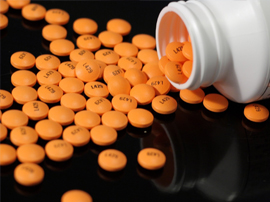If you take daily aspirin for heart health – as 20 percent of Americans do – it’s crucial that you take the right kind, says a top cardiologist.
Plain, non-coated, non-time release, non-buffered aspirin is what you should take, says Chauncey Crandall, M.D., chief of the heart disease prevention program at the world-renowned Palm Beach Cardiovascular Clinic in Palm Beach County, Fla. This is especially important when taking aspirin in an emergency, after a possible heart attack.
“Non-coated is the best type to keep on hand because it’s the fastest acting,” said Dr. Crandall. “Don’t choose coated aspirin or aspirin that says ‘time release’ on the label. Uncoated aspirin, the kind that you probably grew up with, is best, unless you have stomach problems and you think that it may cause an ulcer.”
Dr. Crandall’s comments come in the wake of a new study that sheds light on the phenomena of “aspirin resistance” – which refers to people who don’t seem to get any heart benefits from taking aspirin. The research, published this week in the American Heart Association’s journal Circulation, shows that it may be the coating on aspirin that is to blame.
In the study of 400 healthy volunteers, University of Pennsylvania researchers looked for people who are truly resistant to aspirin, such as might result from a particular genetic makeup. They failed to find a single case of true aspirin resistance. Rather they found false results, which they called “pseudoresistance,” due to the aspirin’s coating, which is added by drug makers in an effort to make the pain reliever easier on the stomach.
Aspirin makes the blood less likely to clot, which lowers the risk of heart attacks and strokes. In people who have suffered a heart attack, low-dose aspirin reduces chances of another one by about one-fifth.
This makes aspirin one of the most effective therapies available. Besides taking a daily low-dose variety as a preventive measure, it is recommended that people immediately chew and swallow a full-strength 325-mg aspirin if they believe they are having a heart attack.
“If you think you’re having a heart attack, you should call 911 and then chew an uncoated regular aspirin,” said Dr. Crandall.
He added that calling the emergency number should always come first, even before going to get aspirin, because life-saving measures can be started at the scene and performed on the way to the hospital.
By Charlotte Libov

